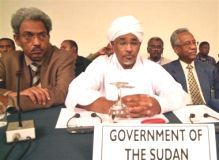Darfur talks headed for 2006, progress slow
Dec 19 2005 (ABUJA) — Talks to end the conflict in Sudan’s Darfur region are progressing but are likely to spill into 2006, the parties said on Monday, despite intense international pressure to clinch a deal by the end of the year.
 The Sudanese government and two Darfur rebel movements are negotiating to end a nearly three-year conflict that has killed tens of thousands and driven more than 2 million people from their homes into refugee camps.
The Sudanese government and two Darfur rebel movements are negotiating to end a nearly three-year conflict that has killed tens of thousands and driven more than 2 million people from their homes into refugee camps.
“I feel we are progressing. We will reach an agreement, most probably after the Eid,” said Mutrif Siddig, a senior negotiator from the government’s side, referring to the Muslim holiday of Eid al-Adha which falls in mid-January.
Sudanese President Omar Hassan al-Bashir was due to discuss progress with Nigerian President Olusegun Obasanjo and with Khartoum’s negotiating team during a one-day visit to the Nigerian capital, where the talks are taking place.
“The president definitely wants to be briefed by the president of Nigeria on outstanding areas which may need resolution, so that he can inject some helpful ideas into the process,” Sudanese Foreign Minister Lam Akol told Reuters.
Obasanjo hands over the chairmanship of the African Union (AU) to Bashir in January. The union is mediating the Darfur peace talks and has 6,000 troops on the ground struggling to contain violence that has worsened in recent months.
The Darfur rebels object to Bashir taking over the reins of the AU while their conflict with Khartoum is unresolved, arguing that the AU will no longer be neutral, but Akol said the handover would not affect the peace process.
“We believe that President Obasanjo should continue as mediator on Darfur even if the chairmanship goes to President Bashir. These are two separate issues. He has started a process that is ongoing so he should be able to continue.”
POWER-SHARING
The two rebel movements, the Sudan Liberation Army and the smaller Justice and Equality Movement (JEM) took up arms against Khartoum in early 2003 over what they saw as neglect and discrimination by the government.
Khartoum fought back through proxy militias, the rebels say, and the ensuing campaign of violence, arson and rape killed tens of thousands of people and made refugees of more than 2 million.
The current round of peace talks in Abuja is the seventh in more than a year. Previous rounds were hampered by infighting within the rebel groups, who have presented a united front this time, allowing substantive issues to be tackled.
The three main areas under discussion are power-sharing, wealth-sharing and security arrangements.
Both sides said the wealth-sharing talks were making good and swift progress, but on power-sharing two serious sticking points were slowing proceedings. These are the rebels’ demands for a Darfur regional government and for the vice-presidency of Sudan to be given to a representative of Darfur.
Positions were so far apart on these issues that talks ceased for all of last week, but they resumed earlier on Monday and both sides said there was a new, more positive approach.
Substantive talks on security arrangements have not started because the sides are still arguing about the agenda.
JEM chief negotiator Ahmed Tugod told Reuters the AU’s proposed agenda listed “disclosure and mapping of rebel-controlled areas in Darfur, and redeployment to defensive positions” in the first item and the rebels objected to that.
“These two points should be part of a comprehensive ceasefire agreement, they have nothing to do with humanitarian enhancement which is the object of the first item,” he said.
(Reuters)
